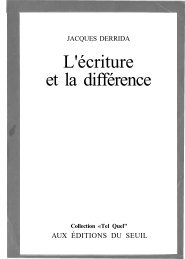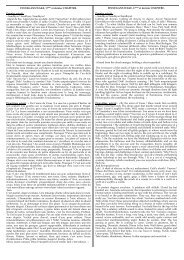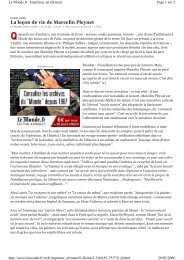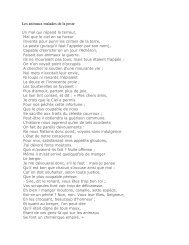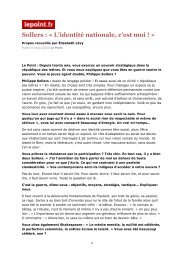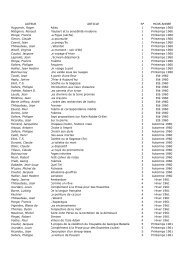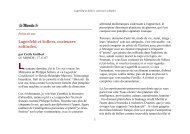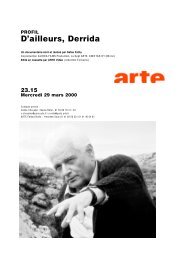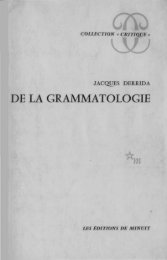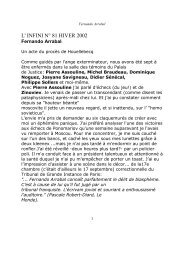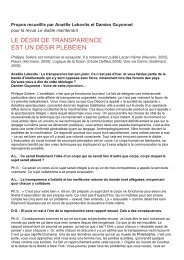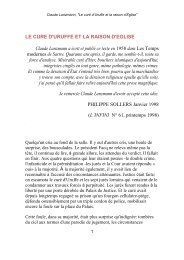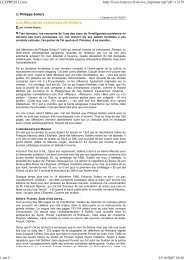necessary in all languages? Why must all possess it, and what is the normal typeof it? If it be so universal it ought to correspond to some primary law of nature.I fancy the professional grammarians have given but a lame response to thisinquiry. <strong>The</strong>ir definitions fall into two types: one, that a sentence expresses a"complete thought"; the other, that in it we bring about a union a subject andpredicate.<strong>The</strong> <strong>for</strong>mer h<strong>as</strong> the advantage of trying <strong>for</strong> some natural objective standard,since it is evident that a thought can not be the test of its own completeness. Butin nature there is no completeness. On the one hand, practical completenessmay be expressed by a mere interjection, <strong>as</strong> "Hi! there!", or "Scat!", or even byshaking one’s fist. No sentence is needed to make one’s meaning more clear.On the other hand, no full sentence really completes a thought. <strong>The</strong> man whosees and the horse which is seen will not stand still. <strong>The</strong> man w<strong>as</strong> planning aride be<strong>for</strong>e he looked. <strong>The</strong> horse kicked when the man tried to catch him. <strong>The</strong>truth is that acts are successive, even continuous; one causes or p<strong>as</strong>ses intoanother. And though we may string never so many clauses into a single,compound sentence, motion leaks everywhere, like electricity from an exposedwire. All processes in nature are inter-related; and thus there could be nocomplete sentence (according to this definition) save one which it would take alltime to pronounce.In the second definition of the sentence, <strong>as</strong> "uniting a subject and a predicate,"the grammarian falls back on pure subjectivity. We do it all; it is a little privatejuggling between our right and left hands. <strong>The</strong> subject is that about which I amgoing to talk; the predicate is that which I am going to say about it. <strong>The</strong> sentenceaccording to this definition is not an attribute of nature but an accident of man <strong>as</strong>a conversational animal.If it were really so, then there could be no possible test of the truth of a sentence.Falsehood would be <strong>as</strong> specious <strong>as</strong> verity. Speech would carry no conviction.Of course this view of the grammarians springs from the discredited, or ratherthe useless, logic of the middle ages. According to this logic, thought deals withabstractions, concepts drawn out of things by a sifting process. <strong>The</strong>se logiciansnever inquired how the "qualities" which they pulled out of things came to bethere. <strong>The</strong> truth of all their little checker-board juggling depended upon thenatural order by which these powers or properties or qualities were folded inconcrete things, yet they despised the "thing" <strong>as</strong> a mere "particular," or pawn. Itw<strong>as</strong> <strong>as</strong> if Botany should re<strong>as</strong>on from the leaf-patterns woven into our tablecloths.Valid scientific thought consists in following <strong>as</strong> closely <strong>as</strong> may be theactual and entangled lines of <strong>for</strong>ces <strong>as</strong> they pulse through things. Thought dealswith no bloodless concepts but watches things move under its microscope.<strong>The</strong> sentence <strong>for</strong>m w<strong>as</strong> <strong>for</strong>ced upon primitive men by nature itself. It w<strong>as</strong> not we
who made it; it w<strong>as</strong> a reflection of the temporal order in causation. All truth h<strong>as</strong> tobe expressed in sentences because all truth is the transference of power. <strong>The</strong>type of sentence in nature is a fl<strong>as</strong>h of lightning. It p<strong>as</strong>ses between two terms, acloud and the earth. No unit of natural process can be less than this. All naturalprocesses are, in their units, <strong>as</strong> much <strong>as</strong> this. Light, heat, gravity, chemicalaffinity, human will have this in common, that they redistribute <strong>for</strong>ce. <strong>The</strong>ir unit ofprocess can be represented <strong>as</strong>:term——transference——termfrom——of——towhich——<strong>for</strong>ce——whichIf we regard this transference <strong>as</strong> the conscious or unconscious act of an agentwe can translate the diagram into:agent——act——objectIn this the act is the very substance of the fact denoted. <strong>The</strong> agent and theobject are only limiting terms.It seems to me that the normal and typical sentence in English <strong>as</strong> well <strong>as</strong> in<strong>Chinese</strong> expresses just this unit of natural process. It consists of three necessarywords; the first denoting the agent or subject from which the act starts; thesecond embodying the very stroke of the act; the third pointing to the object, thereceiver of the impact. Thus:Farmer pounds rice.<strong>The</strong> <strong>for</strong>m of the <strong>Chinese</strong> transitive sentence, and of the English (omittingparticles) exactly corresponds to this universal <strong>for</strong>m of action in nature. Thisbrings language close to things, and in its strong reliance upon verbs it erects allspeech into a kind of dramatic poetry.A different sentence order is frequent in inflected languages like Latin, Germanor Japanese. This is because they are inflected, i.e., they have little tags andword-endings, or labels to show which is the agent, the object, etc. In uninflectedlanguages, like English and <strong>Chinese</strong>, there is nothing but the order of the wordsto distinguish their functions. And this order would be no sufficient indication,were it not the natural order—that is, the order of cause and effect.It is true that there are, in language, intransitive and p<strong>as</strong>sive <strong>for</strong>ms, sentencesbuilt out of the verb "to be," and, finally, negative <strong>for</strong>ms. To grammarians andlogicians these have seemed more primitive than the transitive, or at le<strong>as</strong>texceptions to the transitive. I had long suspected that these apparentlyexceptional <strong>for</strong>ms had grown from the transitive or worn away from it byalteration or modification. This view is confirmed by <strong>Chinese</strong> examples, whereinit is still possible to watch the trans<strong>for</strong>mation going on.



